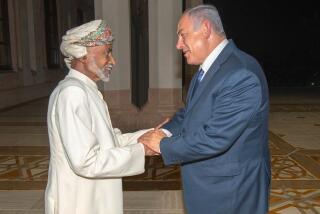Oman Issues Decree for Its First Stock Market
- Share via
MANAMA, Bahrain — Oman has issued a royal decree to set up its first stock market, giving the long-awaited go-ahead to a scheme designed to boost private business.
Bankers in Oman said the decree, issued late Tuesday by Sultan Kaboos bin Said, would trigger detailed work on creating a market, but it could be a year before trading begins.
“Practical details still have to be worked out, but the scheme is now moving forward,” said one banker.
Persian Gulf states have been pressing ahead with plans to foster the role of private business and diversify their economies from overdependence on oil at a time of weak world prices.
The Bahrain government, after nearly two years of preparation, is now close to opening what will be only the second stock trading floor in the gulf after Kuwait.
An experiment with a stock exchange in Saudi Arabia was broken off abruptly after just three weeks last year following what bankers said were protests from conservative religious groups opposed to development of Western-style markets.
In Oman, detailed work is expected to concentrate first on setting up a stock market administration, while a parallel law is being drafted to protect investors’ rights.
A first move to develop Oman’s fledgling capital markets was made in June, 1987, with the creation of a two-week tender for treasury bills. That also brought in cash to help bridge the government’s budget deficit.
Moving Funds Home
There is no stock market at the moment, and, although some 40 to 50 joint stock companies could eventually be listed, shares currently change hands on an unofficial basis. A few brokers operate, but bankers say turnover is minimal.
Gulf states first moved cautiously on the stock exchange front, careful to set up controls to avoid a repeat of the $90-billion crash of Kuwait’s unofficial market in 1982 caused by a wave of speculation based on post-dated checks.
Last October’s crash on world stock markets has worked to the long-term benefit of the region.
Bankers said some Arab businessmen have started to repatriate capital from overseas markets and are seeking ways to invest funds closer to home.
More to Read
Sign up for Essential California
The most important California stories and recommendations in your inbox every morning.
You may occasionally receive promotional content from the Los Angeles Times.












